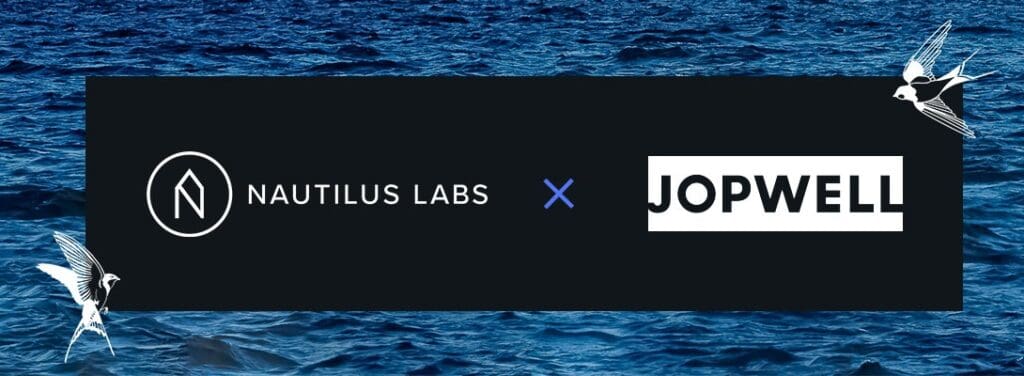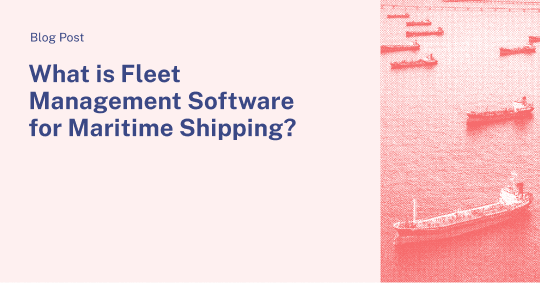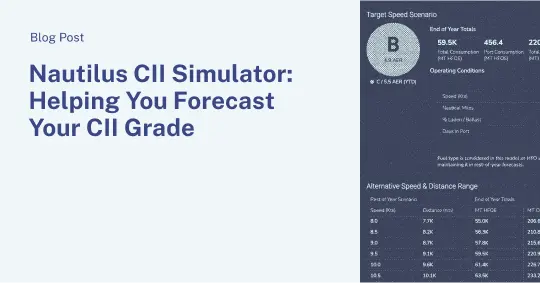Lindsey O’Sullivan, Director of People Operations at Nautilus, talks to Devon Lee, Director of DEI Programs at Jopwell, and Tani Brown, Head of Community at Jopwell
You can only ever be as great as the culture you foster for your team and at Nautilus Labs, we pride ourselves on living our TIDE values. That means we strive every day to be thoughtful, inclusive, direct, and empathetic. These values guide our decisions, internally and externally, and they are especially important to us as we grow our team. As a fast growing company, it’s important to us that we are thoughtful about how we attract talent from underrepresented communities and empathetic as we iterate on what inclusion means to every member of our team — now and going forward.
Nautilus is partnering closely with Jopwell, to ensure that we are speaking to highly-skilled individuals from all backgrounds, deepening and expanding our talent pools through their platform. But how will our partnership with Jopwell enhance our culture and foster inclusivity? We’re joined by Tani and Devon from Jopwell to discuss an inclusive recruitment process, especially in traditional industries, and opportunities for learning and development.
Lindsey: Tani, Devon, thank you for joining me today, as we’re discussing a very important topic. At Nautilus, we see that inclusive hiring in an industry that is very traditional — the maritime industry — can be challenging. How do you think the history of the maritime industry impacts our present?
Devon & Tani: The East Indian Company is noted as the first multinational maritime corporation. They created relationships all over the world that opened the door to international commerce in ways never before imagined. Their relationships, trade agreements and networks ultimately created the foundation that the contemporary maritime industry is built on top of. However, this foundation is also rooted in the enslavement of Africans and decimation of non-European people and resources across the world. The story of the Dutch East Indian Company is also one of diversity, equity and inclusion (DEI) that beg us to take a more critical look at the relationship between our past and present.
The origins of the maritime industry are anchored by a memory of parents and children that were born into systems of thought and action. As is the case with many traditions, the maritime industry has inherited ideas and practices that are discretely attached to identity. That includes diversity. The overrepresentation of white men meant that ways of thinking and being were limited to a narrow racial and gendered experience. In a world where innovation is equally distributed across race and gender, relative exclusion often rationalizes itself. In this case, lack of diversity was [and perhaps is] believed to be a reflection of ability or interest, rather than a reflection of discrimination and access to opportunity.
As a new company, Nautilus Labs has the opportunity to write a narrative of diversity, equity and inclusion into the industry in ways never before imagined. To that end, it is important that gaps in representation are bridged by intentional intervention that is critical of its past. This means turning current recruitment and retention practices that do not promote diversity into problems that are defined well enough to solve. With Nautilus as a beacon, this will ultimately allow the maritime industry to see the distance between where it is and where it wants to be. When navigating the industry to this new destination, it is important to create a narrative that reflects a future never before imagined.
Lindsey: Thank you, Devon. Based on what you’ve just described, it sounds like being direct and intentional with our focus on recruiting talent from underrepresented communities is an absolute imperative. You also talked about changing the historical narrative. It makes me think about what diversity looks like beyond recruitment. What are some steps that we can take to be innovative in our DEI approach?
Devon: I think what most businesses need is a shift in their mindset about diversity. A lot of times, their intention is to look and feel more diverse because of a lack of racial diversity. Many experience a reckoning with the overrepresentation of white employees as a product of racial exclusion or a gap that can be filled by previously unrecognized value. Whatever the case may be diversity is often seen as a problem that can be solved with recruitment. Unfortunately, this puts the cart before the horse…or in your case, the ship behind the propeller.
If there were barriers that prevented diverse talent from entering the profession, hiring may not solve the problem. In a data driven world, it is increasingly important that every business objective be data informed. In the case of diversity, businesses should go beyond recruiting diverse talent. If there are barriers to getting people here, who is to say those same barriers will not push those that we successfully recruit out? To this end, it is important to do these simple things:
- Measure success by your ability to recruit talent from underrepresented communities and nontraditional backgrounds
- Develop job descriptions that target competencies and skill sets over wishlists
- Recruit in spaces that have or serve diverse communities
- Create a holistic interviewing scoring tool that leverages your DEI vision in questions and corresponding evaluation criteria
- Develop an educational strategy that helps people to understand the purpose of your diversity, equity and inclusion programs
- Create opportunities for meaningful interactions with diverse communities
- Build partnerships with mission-aligned organizations that are mutually beneficial
- Create sustainable strategy that considers steps 1-7
While this list is not exhaustive, it is a great starting point in beginning to build a springboard for innovative strategy. These suggestions shift inclusive recruitment into a space of strategic and scalable solutions to address barriers that reflect a history of exclusion. The goal is not to transform demographics, but ways of thinking and being that begin to solve the problems that exist beyond underrepresentation. The return on investment will be worlds of creativity and communities of thought that have not previously been tapped into.
Lindsey: As Nautilus is an early-stage tech company, what other steps should we take, outside of recruitment, to ensure an inclusive work environment for our team, Devon?
Devon: After taking the time to assess how your values can shape your recruitment process, the same process can be applied to creating an inclusive culture. Simply asking people if they feel valued in an anonymous survey and disaggregating responses by race, gender, sexual orientation, veteran status, family status, disability status, and socio-economic status can create an opportunity for transformative dialogue and strategy. There are various inclusion surveys that provide a great example of disaggregated categories and their significance. To that end, Jopwell provides guidance in the creation and implementation of inclusion surveys. We also specialize in the development of strategy in response to survey findings. In cases where disaggregation compromises anonymity, it is important to leverage employee resource groups, open forums, and external relationships to promote personal and professional safety through the collection of controlled qualitative data.
The development of mentorship and sponsorship relationships can also help to foster a sense of inclusion. These relationships strategically design mentoring programs for the intended purpose of leadership promotion and/or skill development. Mentorship and sponsorship creates an opportunity for employees to invest in the success and retention of talent from all backgrounds. These relationships also create opportunities to scale intercultural experiences that can, ultimately, define inclusive company culture. As these relationships manifest, alongside recruitment processes and belonging programs it is important to sustain data collection and employee feedback.
Intentional questions like: have you witnessed or experienced issues of racism, sexism or homophobia during work hours can also create insight into cultural components of bias. For groups that feel less valued than others, focus groups can create an opportunity for understanding as well as develop action steps to promote inclusion. Once you get beyond the assessment stage, it is important to leverage data into education. Educational strategy can then lend itself to sustainable partnerships and mutually beneficial diversity, equity, and inclusion programs that build bridges across past barriers.
Lindsey: Tani, 2020 has been a challenging year for everyone and we’re all very much looking forward to 2021. What is your team at Jopwell looking forward to in 2021?
Tani: Jopwell’s mission is to make a substantial, measurable impact on increasing Black, Latinx, and Native American representation in the workplace and to facilitate a national dialogue about workforce diversity. With the global racial justice awakening of last summer and momentum around accelerating workforce DEI, we are most excited about our growth as a trusted resource for our community and our innovation around the diversity technology space. We are also excited to roll out an advisory business in 2021 to help partners tackle DEI opportunities via holistic, human-centered strategies.
Ultimately we believe that providing access to resources, community, and career opportunities for untapped talent pools such as Black, Latinx, and Native American students and professionals creates a vital network that accelerates a greater workforce for all and we look forward to 2021 and beyond!
Lindsey: Tani, Devon, thank you so much for your insights. It’s been a pleasure learning how companies like Nautilus can change the narrative and build towards progress. DEI is more than hiring and it starts with a commitment to change, led by shift in team mindset. We are excited to work with Jopwell, partnering to operationalize our TIDE values and — to use your words — put the ship in front of the propeller. With 2021 upon us, I know our entire team is looking forward to a renewed and strategic focus on diversity, equity, and inclusivity on the path towards a carbon free future in shipping.

ICYMI: In 2020, Nautilus decided not to send holiday gifts to our clients. This year, more than ever, in an industry that has been suffering from a humanitarian crisis with thousands of seafarers stranded at sea, not being able to return to their families due to an ongoing pandemic, Nautilus decided to support seafarers, essential key workers. We’re donating to ISWAN (International Seafarers’ Welfare and Assistance Network) that helps seafarers and their family members globally. Join us in doing good and visit ISWAN and leave a donation or support the organization that fights for what matters to you.


